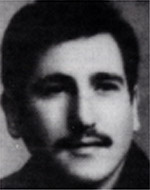Atias, Shimon
Son of Esther and Sa’adia, was born on December 2, 1942 in Casablanca, Morocco. Shimon graduated from a European school in Morocco, where his studies were conducted in French. He was a good student, diligent and disciplined. From his youth, Shimon was a sports enthusiast, and was primarily interested in football. During his leisure, he used to play with his friends for his pleasure and for his physical fitness. In 1957 Shimon immigrated with his family to Israel, where he studied the mechanics of automotive mechanics. He worked hard in his profession and earned his living. And as a devoted son to his family, Shimon used to save money from his salary to help the family cope with the burden of the household agriculture. He was good-hearted, kind and considerate, and he always helped every person with his work and advice. Shimon was active in the company, used to organize social activities with his friends and worked for them to form a cohesive group that spent many years together and enjoyed together. Shimon was drafted into the IDF in August 1960. He was trained in the Ordnance Corps and was trained as a mechanic and was sent to a supply unit. To work as a civilian employee of the IDF. In 1966 he married a wife, and a year later his eldest daughter was born. He was an exemplary father and husband, dedicated and caring for his family. He always maintained a proper relationship, and did much to the well-being and happiness of his family. In 1970 his son was born, and six years later his second son was born. Although his hard work had robbed him for a long time, Simon paid close attention to his family and children. He spent many hours with them in games and trips, and he did their education and to give them a way of life and education. In October 1976, Shimon decided to return to the army, and received the rank of First Sergeant for a technical position in the IAF. He excelled in his technical knowledge and in the level of his performance, and was rewarded by his commanders for his work and his contribution to raising the level of work in his unit. On May 5, 1979, Shimon was taken to the military cemetery in Rehovot, where he left behind a wife, two sons and a daughter, two parents and two sisters. “I want to tell you about Sgt. Shimon, as we knew him in the unit, a man dedicated to his work, loyal to the unit and soldier, accepted and loved by his commanders and soldiers, never complained of work pressure. And sought to advance to higher positions, and even when he felt ill, he preferred to continue his work and postponed his going to doctors … “
